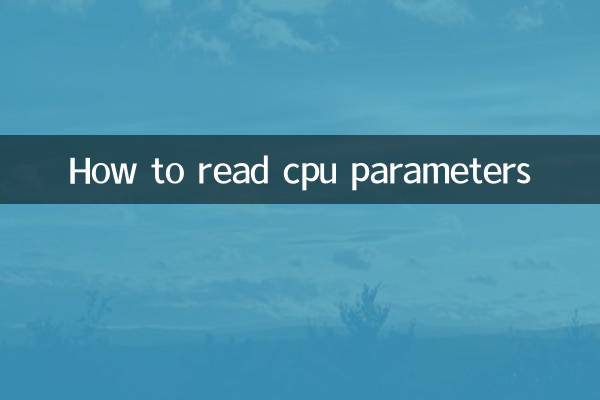How to view CPU parameters? An article will give you a comprehensive analysis
In today's digital era, the CPU (central processing unit) is the core component of the computer, and its performance directly determines the operating efficiency of the device. Whether you're buying a new computer or upgrading an old device, knowing your CPU parameters is crucial. This article will give you a detailed analysis of how to understand CPU parameters, as well as recent hot topics and hot content.
1. CPU parameter analysis

There are many parameters of CPU, but they can mainly be understood from the following aspects:
| Parameter name | meaning | importance |
|---|---|---|
| Number of cores | The number of processing units inside the CPU. The greater the number of cores, the stronger the multi-tasking capability. | high |
| Number of threads | The number of threads that each core can process simultaneously. The greater the number of threads, the stronger the parallel processing capability. | high |
| Main frequency | The clock frequency of the CPU, in GHz. The higher the main frequency, the stronger the single-core performance. | in |
| cache | The high-speed memory inside the CPU. The larger the cache, the faster the data access speed. | in |
| Process technology | The process level of manufacturing CPU, in nanometers (nm). The smaller the process, the lower the power consumption. | high |
| TDP | Thermal design power consumption, in watts (W), the lower the TDP, the smaller the cooling requirements | in |
2. Recent hot topics and hot content
Recently, hot topics about CPU on the Internet mainly focus on the following aspects:
1.Intel 13th generation Core processor released: Intel’s latest 13th generation Core processor has significantly improved performance and energy efficiency, especially the optimization of multi-core performance, which has triggered widespread discussion.
2.AMD Ryzen 7000 series launched: AMD's Ryzen 7000 series processors adopt the new Zen 4 architecture, and the process technology has been upgraded to 5nm. The performance has been significantly improved and has become the focus of the market.
3.Apple M2 chip performance controversy: Apple’s M2 chip has performed well in the thin and light laptop market, but its performance comparison with high-end desktop CPUs has triggered heated discussions among users.
4.The rise of domestic CPUs: In recent years, domestic CPUs such as Loongson and Feiteng have gradually emerged, especially in the field of innovation and innovation, and have made significant progress and become a hot spot in the industry.
3. How to choose the CPU that suits you
When choosing a CPU, you need to decide based on your own needs:
1.Office users: For light usage scenarios such as daily office work and web browsing, choosing a mid-to-low-end CPU with 4 cores and 8 threads can meet the needs, such as Intel Core i3 or AMD Ryzen 3 series.
2.gamer: Game performance requires high single-core performance of the CPU. It is recommended to choose a CPU with a high frequency and a large cache, such as Intel Core i5/i7 or AMD Ryzen 5/7 series.
3.content creator: Tasks such as video editing and 3D rendering require powerful multi-core performance. It is recommended to choose a CPU with a large number of cores and a high number of threads, such as Intel Core i9 or AMD Ryzen 9 series.
4.server user: The server needs to run under high load for a long time. It is recommended to choose a server-class CPU that supports ECC memory and has a low TDP, such as Intel Xeon or AMD EPYC series.
4. Summary
It is not difficult to understand CPU parameters. The key is to understand the meaning of each parameter and its impact on performance. The recent launch of new products by Intel and AMD and the rise of domestic CPUs have provided consumers with more choices. Hopefully this article will help you make a more informed decision when buying or upgrading your CPU.

check the details

check the details